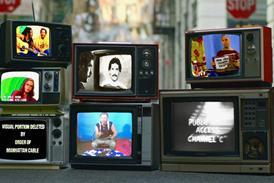EXCLUSIVE: New MEDIA head Lucia Recalde Langarica tells Screen about untapped potential in European talent.
Striking the “best possible balance between continuity and innovation” will be one of the key priorities in 2015 for Lucia Recalde Langarica, the new Head of Unit at Creative Europe’s MEDIA sub-programme.
In an exclusive interview with Screen in Riga during the European Film Awards weekend, Spanish-born Langarica explained: „We need to see how, without revamping the programme, we can continue those actions which are proving very useful and, at the same time, incentivise new ways of doing things.“
“Something very close to my heart is fostering talent and the question of how can we make the best of the untapped potential that exists in Europe,“ she continued. “Innovation can be fostered by bringing people together from different backgrounds, disciplines and specialisations, and that is the best way to generate new ideas.”
“Innovation is often seen only in technological terms, but in Creative Europe - MEDIA , one can also drive innovation through people and content.”
Langarica’s background as the Head of Unit for Higher Education, Innovation and Entrepreneurship at the European Commission and head of the European Institute of Technology (EIT) has certainly informed her emphasis on fostering innovation in her new job at Creative Europe.
“These days, i think innovation is key for any industrial sector and this is also the case for the audiovisual one,” she noted. “Something very positive in the MEDIA Programme is that it has already been adapting itself to these innovational challenges.”
Plans for 2015
Heading the MEDIA unit since September 1, Langarica revealed some of the areas she will be working in the coming months.
The first half of next year will see the unit having negotiations with the European Investment Fund about running the financial guarantee facility from 2016.
“And we will also be giving shape to the European Film Forum which was announced in the Commission’s Communication last May. We have been waiting for guidance from our new political masters to determine the approach, but I am sure that we will be able to give more concrete details about the Forum at the Berlinale in February. We will be wanting to identify a number of issues which we consider particularly imporant and where there is some momentum. The issues will determine the shape of the Forum: We don’t want to re-invent the wheel or create groups for the sake of creating groups, but rather build on existing groups.”
In addition, she is “keen” to create an impact group as part of an ongoing process of fine tuning “to see how the guidlerines we developed for the selection of the projects functioned and use the feedback to possibily adapt the guildeines for the next round of calls. We need to have a circular approach and take the sector’s reality into account in order to shape the programme.”
Moreover, next year will see MEDIA commissioning a study from the Strasbourg-based European Audiovisual Observatory on the current situation of the European animation industry.
Concerns
In response to concerns about the wisdom of having the Creative Europe two sub-programmes shared under the responsibility of two Commissioners [DG Connect and DG EAC], Langarica counters that “the most important message is that the legal basis of the programme will not change for the next seven years. The programme won’t change, but it will be within a broader policy framework. The new Commission President Juncker insisted that he would like to de-silo the Commission and see us working less on a vertical basis and more in horizontal collaborations.”
“All in all, we see real advantages because we can contribute as well as benefit from working together with other parts of the Commission. In our case, this means us working hand in hand with DG EAC to implement the programme.”
In fact, only last week, the Czech Liberal Democrat MEP Petr Ježek tabled a question to the Commission about the sharing of Creative Europe between DG Connect and DG EAC.
“Like a number of artists and cultural professionals, I am concerned that this division could be detrimental to the efficient implementation of the programme,” he wrote.
2015 Budget
As far as the MEDIA sub-programme’s budget for 2015 is concerned, Langarica suggests that it is “too premature” to say if they will have to target specific schemes for cuts or make reductions on the overall number of projects supported.
Last week, the Council meeting of European Union’s Education Ministers adopted the member states’ position on the new EU draft budget for 2015, which sees a reduction of over €2.9m in so-called payment appropriations for Creative Europe compared to a previous draft.
According to this latest draft, the MEDIA sub-programme would be allocated € 1.35m less than the previously proposed sum of €70.9m.
“We will first analyse the final figures,” Langarica said. “And then, based on the experiences with the 2014 calls for projects, try to see how we can minimise the impact of any potential reductions, but also maximise the overall impact of the programme.”
Latvia and EU audiovisual policy
Andris Mellakauls of Latvia’s Ministry of Culture spoke to Screen about the importance of audiovisual policy during his country’s Presidency of the Council of the European Union for the next six months from January 1, 2015.
He revealed that an audiovisual conference will be held in Riga at the beginning of March, entitled “Strengthening the European audiovisual media market – for the development of the European identity”, to address such issues as the scope of the Audiovisual Media Services Directive (AVMSD) currently under review and the country of origin principle for audiovisual media services.
In addition, a discussion paper will be prepared for the Council of Culture Ministers to have a politicial debate about the necessity for distinctions to be made in future audiovisual legislation between propaganda channels like Russia Today and bona fide media services.
Moreover European Commissioner Andrus Ansip, Vice-President for the Digital Single Market, was in Riga last week to discuss the digital priorities of Latvia’s EU Presidency.
In a speech on the European Commission’s plans of a Digital Single Market, Ansip explained that “apart from stopping online consumers being blocked because of their location or residence, this will involve reforming and modernising copyright rules and getting rid of unjustified curbs on transfer and access to digital assets.”
“Other areas of work will aim to guarantee online access, connectivity and investment to build the digital economy and make the Digital Single Market matter to businesses,” Ansip said.
More around Europe
* The Polish MEP Bogdan Wenta met today with Jakub Duszynski, co-president of Europa Distribution and one of the selection panel members of the LUX Film Prize, in Strasbourg to discuss film distributors’ views on the future direction for European audiovisual policy.
As a member of the European Parliament’s Committee on Culture and Education, Wenta has been charged as a rapporteur with responding to the European Commission’s Communication on European film in the digital age.
Previously, Wenta and fellow MEPs Helga Trüpel and Jean-Marie Cavada had a breakfast meeting with Jan Runge, CEO of the International Union of Cinemas (UNIC) to discuss the Communication’s proposals from the exhibitors’ perspective.
* Wroclaw’s T-Mobile New Horizons International Film Festival will stage a special programme in 2016, entitled Masters of European Cinema, with a series of retrospectives of recognised European auteurs - from Fellini and Bergman to Haneke and Almodóvar - to promote the heritage and diversity of European art cinema as part of the European Capital of Culture calendar. The festival will be held from July 21-31, 2016.




















No comments yet